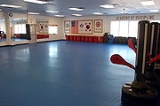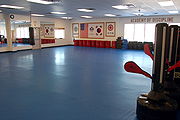
Dojang
Encyclopedia


Korea
Korea ) is an East Asian geographic region that is currently divided into two separate sovereign states — North Korea and South Korea. Located on the Korean Peninsula, Korea is bordered by the People's Republic of China to the northwest, Russia to the northeast, and is separated from Japan to the...
n martial arts
Martial arts
Martial arts are extensive systems of codified practices and traditions of combat, practiced for a variety of reasons, including self-defense, competition, physical health and fitness, as well as mental and spiritual development....
, such as taekwondo
Taekwondo
Taekwondo is a Korean martial art and the national sport of South Korea. In Korean, tae means "to strike or break with foot"; kwon means "to strike or break with fist"; and do means "way", "method", or "path"...
, Kuk Sool Won
Kuk Sool Won
Kuk Sool Won is a Korean martial arts system founded by Suh In-Hyuk |Grandmaster]]) in 1958. The name Kuk Sool Won translates to "National Martial Art Association" and despite often being shortened to 'Kuk Sool,' the name kuk sool is a non-trade marked name used to denote similar Korean martial...
, and hapkido
Hapkido
Hapkido is a dynamic and also eclectic Korean martial art. It is a form of self-defense that employs joint locks, techniques of other martial arts, as well as kicks, punches, and other striking attacks...
, that refers to a formal training hall. It is typically considered the formal gathering place for students of a martial art to conduct training, examinations and other related encounters.
Meaning
Do (道) means 'the way' or 'art' and Jang (場) means 'a place'. Which makes dojang the place where one practices the way. In the case of martial arts it is the place where one practices the path of that martial art, much like DojoDojo
A is a Japanese term which literally means "place of the way". Initially, dōjōs were adjunct to temples. The term can refer to a formal training place for any of the Japanese do arts but typically it is considered the formal gathering place for students of any Japanese martial arts style to...
in Japanese. More specific terms such as "hapkidojang" or "taekwondojang" can be used for particular subtypes of dojang. The word Dojang (道場) originates from Buddhism
Korean Buddhism
Korean Buddhism is distinguished from other forms of Buddhism by its attempt to resolve what it sees as inconsistencies in Mahayana Buddhism. Early Korean monks believed that the traditions they received from foreign countries were internally inconsistent. To address this, they developed a new...
. The dojang is a place where meditation and practice takes place in the temple.
Decoration
The dojang walls can be decorated with a variety of items ranging from the national and federation flag to pictures and calligraphy and boards with the names of techniques practiced in the dojang on it. In general, Korean dojangs are usually heavily decorated.In dojangs where the practice of the art may involve much falling, there will usually be mats on the floor. In older days the floor could also be covered with the sacks rice was stored in, but in modern days there are a variety of mats available.
At the beginning of class, students will line up according to their rankthe highest-ranking students at the front right and the lowest-ranking students at the back left from the point of view of the students. If several students are of the same rank, age or age of rank will determine their places in line.
Usage
The Korean word for gymGym
The word γυμνάσιον was used in Ancient Greece, that mean a locality for both physical and intellectual education of young men...
is more commonly translated as Che Yuk Gwan (체육관), which means 'sports place'. Dojang refers to the actual place in the gym where practice takes place.
The equivalent Japanese
Japanese language
is a language spoken by over 130 million people in Japan and in Japanese emigrant communities. It is a member of the Japonic language family, which has a number of proposed relationships with other languages, none of which has gained wide acceptance among historical linguists .Japanese is an...
term for "dojang" is "dōjō
Dojo
A is a Japanese term which literally means "place of the way". Initially, dōjōs were adjunct to temples. The term can refer to a formal training place for any of the Japanese do arts but typically it is considered the formal gathering place for students of any Japanese martial arts style to...
" (道場), while the Chinese
Chinese language
The Chinese language is a language or language family consisting of varieties which are mutually intelligible to varying degrees. Originally the indigenous languages spoken by the Han Chinese in China, it forms one of the branches of Sino-Tibetan family of languages...
equivalent is Wu Guan (武館), which means "place of the way."

